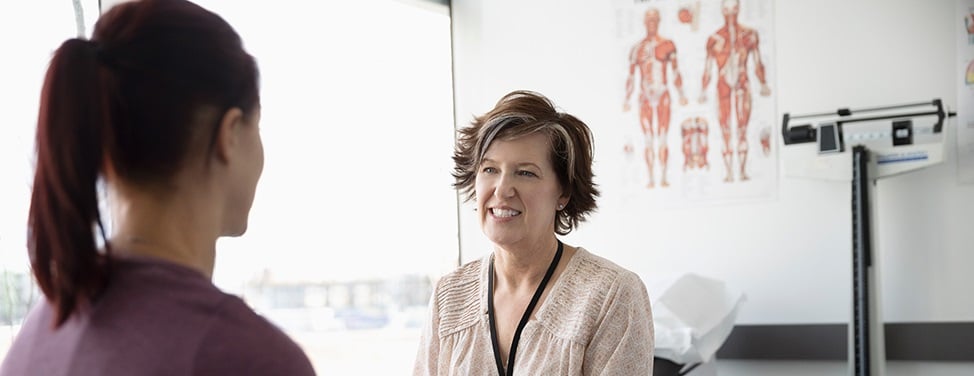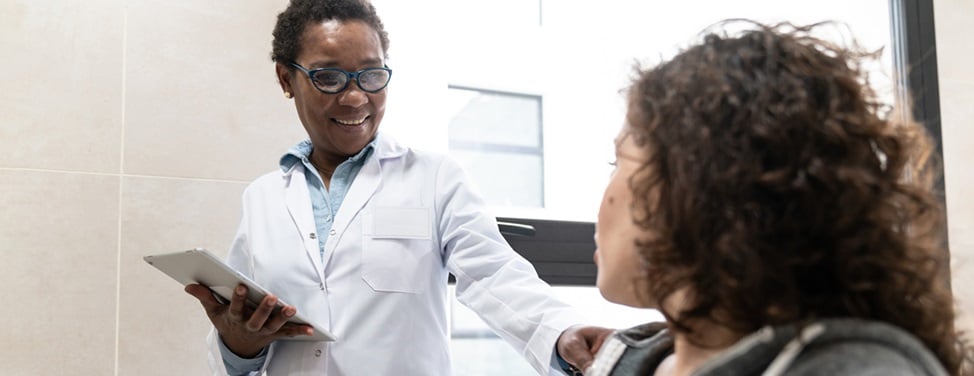
FAQ: Radiation Oncology
- What will happen during my first visit with the doctor?
- How long after my first visit will I start treatment?
- Will you need copies of my medical records?
- Can I participate in a study of a new treatment or technique?
- Who can I call with questions?
- When will I be contacted to schedule my initial appointment?
- When is the next available appointment?
- What paperwork should I fill out before my first appointment?
- What should I bring to my first visit?
- Which insurance plans do you accept?
- Will I need to undergo additional imaging?
- Which doctor will I see?
- What is a simulation appointment?
- Where will I go for treatments?
- Which machines will be used for my treatment?
- How long will my treatment course last?
- What are the treatment's side effects?
- How often will I see my doctor during treatment?
- What role do physicists play in this treatment?
What will happen during my first visit with the doctor?
At your first consultation, a UCSF radiation oncologist as well as a resident physician will spend a few hours with you to evaluate your case, perform a physical exam and explain your treatment options. In addition, we'll take a photo of you (from the shoulders up) to make an identification card, allowing for easy check-in at future radiation oncology appointments.
Learn more about your visits on the Radiation Oncology Program page. Scroll down to "Guides and forms" and look for the "New patient roadmap" pdf.
How long after my first visit will I start treatment?
Your doctor will discuss this with you during the consultation.
Will you need copies of my medical records?
Yes. Your referring doctor will need to provide us with the records relevant to your condition. For more information, visit the Radiation Oncology Program page. Scroll down to "Guides and forms" and look for the "Medical records checklist" pdf that pertains to your condition.
Can I participate in a study of a new treatment or technique?
Your doctor will discuss this with you during the initial consultation. You can also read about the UCSF Department of Radiation Oncology's active clinical trials.
Who can I call with questions?
For scheduling and administrative questions, you can find our phone number on the main Radiation Oncology Program page.
Visit our Billing and Insurance page for support and contact information related to payments and health insurance.
When will I be contacted to schedule my initial appointment?
Our new patient coordinator will call you two to five business days after we receive your referral and medical records.
When is the next available appointment?
Appointment availability depends on each doctor's schedule and current caseload.
What paperwork should I fill out before my first appointment?
Please complete the new patient forms, available on the Radiation Oncology Program page under "Guides and forms." You may send your completed paperwork to the email address or fax number listed on the forms or bring them to your initial consultation.
What should I bring to my first visit?
Please bring the following items:
- New patient forms (if not already submitted)
- Insurance cards
- Government-issued photo ID
- List of questions you wish to ask
- Device or pen and paper for taking notes
Which insurance plans do you accept?
Please visit our Health Insurance page for a list of participating insurance plans.
Will I need to undergo additional imaging?
Your doctor will discuss this with you during the initial consultation. You may be asked to have an MRI scan, CT scan, PET-CT scan, mammogram or other type of imaging test.
You'll most likely see the doctor listed on your referral. But you may be assigned to a different doctor who's available sooner or better suited to take your case.
What is a simulation appointment?
Several days after the initial consultation, your radiation oncologist and a radiation therapist will conduct a treatment simulation. Together, they will outline your treatment areas, collect CT images, and create cradles or casts if needed to ensure consistent positioning during your treatment.
Where will I go for treatments?
Your doctor will discuss the location with you during the initial consultation.
Which machines will be used for my treatment?
Your doctor will discuss this with you during the initial consultation.
How long will my treatment course last?
Your doctor will discuss this with you during the initial consultation. Each treatment takes 30 to 45 minutes. In some cases, delays between sessions may occur.
What are the treatment's side effects?
Your doctor will discuss this with you during the initial consultation. At that time, be sure to ask all your questions about potential side effects.
How often will I see my doctor during treatment?
Most patients have a weekly doctor visit during treatment.
What role do physicists play in this treatment?
Our world-renowned medical physics team ensures that our patients receive the highest quality radiation therapy. These specialists support the care you receive from your doctor and other specialists, which is grounded in our dual mission to educate the next generation of radiation oncologists and to research the treatments of tomorrow.
For more information on how to navigate cancer care, please refer to the UCSF Cancer Center Guidebook. You'll find parking instructions, activities, and brief explanations of terms related to the UCSF Helen Diller Family Comprehensive Cancer Center. For more information on our providers, specific conditions and treatments, please view our program website.
UCSF Health medical specialists have reviewed this information. It is for educational purposes only and is not intended to replace the advice of your doctor or other health care provider. We encourage you to discuss any questions or concerns you may have with your provider.









